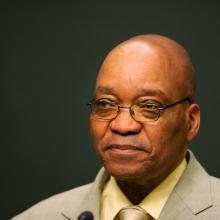
Mr Zuma made the surprise resignation announcement after days of defying orders from the ruling African National Congress to leave office and on the eve of a no-confidence vote in Parliament.
The 75-year-old said in a televised address yesterday he was a disciplined member of the ANC, to which he had dedicated his life.
"I fear no motion of confidence or impeachment . . . I will continue to serve the people of South Africa and the ANC. No life should be lost in my name."
Mr Zuma, a former anti-apartheid activist who has led the ANC since 2007 and been South African president since 2009, was due to leave power next year.
His tenure has been marred by economic decline and multiple charges of graft, undermining the image of legitimacy of the party that led South Africans to freedom in 1994.
The chaotic political crisis of recent days has further damaged the ANC, angering many South Africans who are calling for more transparency in the way the party operates.
Mr Ramaphosa won a bitterly fought internal election in December and is seen as the standard bearer of the party’s reformist wing, but he faces large problems.
The country has enormous resources and wealth but also has massive inequality and poverty. Young people without jobs are increasingly impatient for change.
Although successive ANC governments have built houses and made efforts to supply basic services to millions of people, they have been unable to meet expectations.
Many people live without electricity or sanitation. Schooling and healthcare are often basic and a recent survey found eight out of 10 9-year-olds in South Africa are functionally illiterate. Levels of violent crime are among the highest in the world, with poor South Africans suffering the most.
Cape Town, the country’s second-largest city, may run out of water as soon as April.
Corruption is rife in South Africa, undermining both public finances and confidence.
Mr Zuma, like Robert Mugabe, the former president of Zimbabwe, became a dictator. Getting rid of Mr Mugabe took much longer than the time taken to convince Mr Zuma to go. The actions of the men have caused immense damage to both economies.
Mr Mugabe and his wife Grace continue to live in luxury in Harare. They get a residence, a car fleet and private air travel as part of the government-funded retirement package for former leaders.
Mr Zuma, who built an enormous house for he and his family, is likely to receive similar treatment. Punishment is not an option.
The first task for Mr Ramaphosa will be to unite the ANC before the campaign for the 2019 elections. Although the ANC’s political dominance is not threatened by Opposition parties, it has lost some of its attraction to younger voters. Recent local government elections meant the ANC suffered serious setbacks. Mr Ramaphosa will be hoping to avoid having to form a coalition following the elections. There is hope on the horizon for South Africa. In recent days, the rand has strengthened and many analysts have revised upwards their forecasts for South Africa’s economic growth — although 2% GDP growth is still not enough to create the millions of jobs needed.
Mr Ramaphosa’s election will be the turning point for the country, not just the ANC. More than 54 million South Africans, along with many others across the continent and the world, will be watching closely as he starts to rebuild a tarnished image. There is hope change is on the way, change which is inclusive of all South Africans. With 30% of the South African population aged 15 or younger, they cannot remember the repressive apartheid regime. They need a future in which they can be confident will meet their aspirations.












